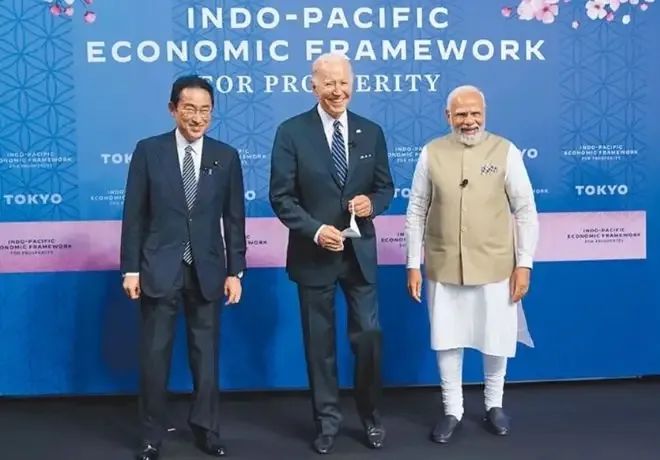This time, India did not face the United States
Author:Global Times Time:2022.09.13
The "Indo -Pacific Economic Framework" (IPEF), led by the United States and a total of 14 countries, recently held a ministerial meeting in Los Angeles, USA. This is the first official high -level meeting since the framework officially launched in May this year.
The "Indo -Pacific Economic Framework" (IPEF), led by the United States and a total of 14 countries, recently held a ministerial meeting in Los Angeles, USA. This is the first official high -level meeting since the framework officially launched in May this year.
According to a statement after the meeting, India is one of the only members who have not signed the four pillars of the framework -the trade negotiation agreement. The author believes that, like the withdrawal of the "Regional Comprehensive Economic Partnership" (RCEP) in 2019, although India's move is unexpected by many people, it is reasonable from India's thinking.
The "Indo -Pacific Economic Framework" was an important measure to strengthen the country's economic connection with regional national economic connections after the United States withdrawn from the "Cross -Pacific Partnership Agreement" (TPP) in 2017. There are currently 14 members of the framework, including the United States, Australia, India, Japan, South Korea, New Zealand, Singapore, Vietnam and other countries.
India is very positive about the framework, not only decided to join the first time, but also repeatedly praised in international occasions. So, how to understand India's withdrawal from the framework trade negotiation?
First, India reproduces "Indian pride". The author believes that when investigating India's policies in specific fields such as economy, diplomacy, and security cannot get rid of India's culture and strategic traditions and treat them is isolated.

Since the Indian People's Party ruling in 2014, although India has not fully inherited the "non -alliance" foreign policy that belongs to the historical heritage belonging to the National University of China, and moves towards the "different interests and positions on different issues to determine the cooperation between different issues and positions. "Multi -faceted alliances" policy, but there is no doubt that India has become a "loud and colorful country" and the ambitions of refusing to improperly "international relations" have never changed.
In other words, India will not continue this cooperation and coordination on other issues because they maintain close cooperation with a country or group on a certain issue. On the contrary, if other issues do not match the national interests identified by India, India will not hesitate to sing.
India's statement in the Ukrainian crisis proves this: refusal to follow the United States to carry out political condemnation and economic sanctions against the United States, but instead increased its purchase of cheap Russian oil. Even if politicians from Washington and Brussels repeatedly visited New Delhi for this reason, bitterly persuaded or even pressure.
Secondly, India believes that trade negotiations under the framework are "unprofitable." According to US media disclosure, due to the fear of domestic protectionism and other factors, the framework did not provide preferential clauses in the US market access at the beginning of its launch, and did not make any promises in terms of tariff reduction.
From the beginning, it means that it is impossible for developing countries such as India to obtain targeted tariff reduction and exemption through trade arrangements under this framework, and to obtain greater opportunities for Indian goods and services to enter the US market.
In addition, the trade negotiations of the framework have linked environmental, labor and other terms to trade, and India expressed concerns about it. The Minister of Commerce and Industry in India said that he hopes to avoid any provisions that may harm India's trade interests. "On the issue of environmental protection, developing countries must use low -priced and affordable energy to support economic development. It is a discrimination against developing countries on this issue."
The "Indo -Pacific Economic Framework" can be described as the Bayeng government to make up for its "Indo -Pacific Strategy" economic shortcomings, strengthen the key partnership with East Asia Pacific, and even "shape the Chinese strategic environment". In addition to trade, the framework also includes three pillars: supply chain, clean economy and fair economy (tax and anti -corruption).
The 14 member states reached an agreement on the three pillars other than trade. US Secretary of Commerce Raymond said that "member states are quickly promoting the framework of the framework" and "the United States hopes that member states will reach a cooperation agreement in November 2023" Essence In fact, as early as the beginning of the launch, U.S. officials stated that the Bayeng government intends to reach a substantial cooperation agreement within 12 to 18 months.

Although the ambition is not small, there are major defects in this framework: it is essentially a tool for the United States to implement its global strategy and geopolitical strategy, and the United States is unwilling to carry out market access, tariff reduction and other fields to the country's market access, tariff reduction and other fields. Rest.
In short, the United States hopes that the deadlocked countries will board the ship, but at the same time let other countries buy tickets and even pay high -priced tickets. After the member country gradually discovered that the framework does not help the development of the country and trade, it is questionable how enthusiastic and substantial participation can be involved.
At the same time, some member states, including India, are in the fields of digital economy, cross -border data transfer, labor and environmental rules, and there are major differences with the United States, Japan and other countries. The continuation and manifestation of the contradictions of the country and developing countries in this framework cannot be completely resolved in the foreseeable future.
Even Raymond Doro was forced to admit that the member states failed to reach consensus when they failed to complete the four "pillar" negotiations. Regarding the future of the framework, you can "listen to his words and watch it." The internal contradictions are heavy, and the "paper tiger" cannot become a "true tiger".
Author Wang Shida, the deputy director of the South Asia Institute of China Modern International Relations Research Institute
- END -
The 21st Century Center was officially approved to become the first batch of UN "Ocean Ten Years" implementation partners

On July 8, 2022, Vladimir Labinin, Executive Secretary -General of the UNESCO Gove...
I won't do it even Poland this time

According to Reuters Berlin on July 1st, Ukraine Ambassador to Germany Andri Melin...